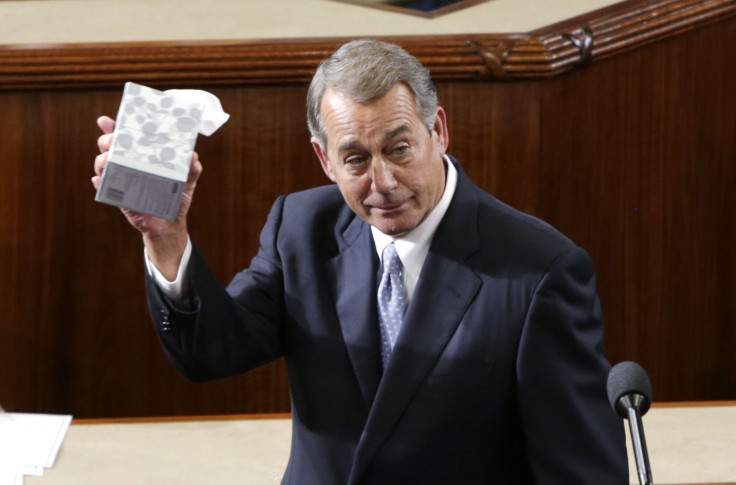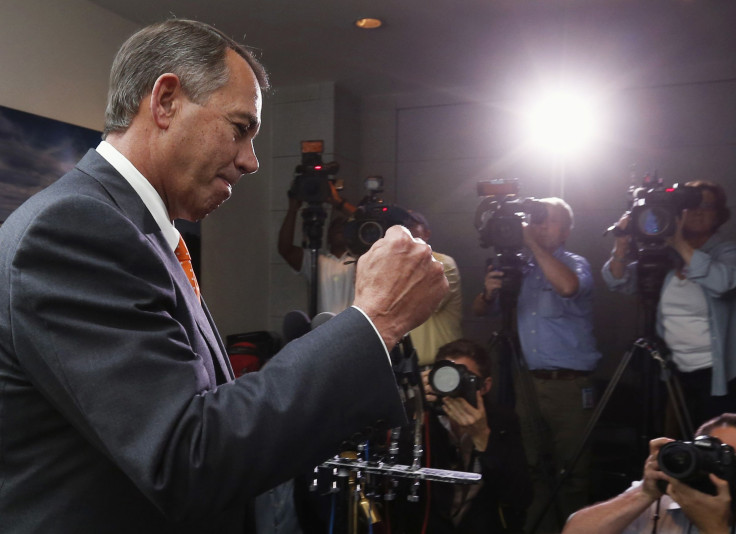What Will John Boehner Do Now? Ex-Speaker Could Cash In On Millions As Lobbyist, Author And More

Former Speaker of the House John Boehner may have officially bequeathed his gavel, but he won’t be leaving Congress empty-handed. In addition to taking whatever knickknacks and photographs that lined the walls of his office, Boehner will also carry a thick Rolodex loaded with names and numbers associated with some of the country’s wealthiest industries.
Retiring speakers like Boehner leave public office with a skillset and assets that are nearly unrivaled. Years of experience on Capitol Hill leave them with an abundance of political knowledge, specifically as it relates to raising money for their respective parties and developing relationships across the private sector. Many speakers who came before Boehner have leveraged that powerful know-how to fill their bank accounts and investment portfolios from lucrative lobbying positions and seats on corporate boards. It's just a matter of time before we learn how, not if, the nation’s 61st speaker of the House turns his wealth of congressional experience into just plain wealth, analysts said.
“It will absolutely be in the millions, there’s no question about that,” John Hudak, a fellow of governance at the Brookings Institute, a Washington, D.C., think tank, said, referring to the amount of money Boehner will earn in the private sector. “The only government official who’s going to do better after leaving government is probably an ex-president.”

From Boehner’s now-disgraced GOP predecessor Dennis Hastert to '90s Speaker Newt Gingrich, the gavel has proven to be a money magnet. While Hastert left office with a vastly inflated net worth compared to when he was first sworn in as a junior representative from Illinois in 1987, he proceeded to make as much as $2 million a year lobbying for D.C. firm Dickstein Shapiro, representing a revolving roster of clients.
Of course, K Street – named for the thoroughfare where most Washington, D.C., lobby firms are stationed – isn’t the only way a former speaker can line his or her pockets. Gingrich, who amassed his wealth via a web of businesses he owns and maintains, had an estimated net worth of between $7 million and $31 million in 2012 when he ran for president, a little more than a decade after he left public office.
Former speakers don’t even need to leave Congress to grow their bank accounts: House Minority Leader Nancy Pelosi, D-Calif., who was speaker from '07 to '11, saw her net worth peak past $100 million in 2010, the year she lost her gavel, according to the Center for Responsive Politics.
But mostly, part of the reason why post-speaker life – and life after being in public service in general – has become so lucrative is the expanded lobbying industry in Washington. Lobbying has grown faster than any measure of government size or the economy, according to the Sunlight Foundation, as businesses and industries compete for influence. Total lobbying expenditures topped out at $1.45 billion in 1998 and reached $3.52 billion 12 years later, according to CRP data. That figure hasn’t dropped below $3.24 since.
Boehner can be valuable to a lobbying firm or corporations that want him on their boards, if he chooses either of those routes, not simply because of his former title. With over two decades serving in the House, he has made connections to a vast network of people in the capital as well as the Capitol. Boehner has 27 former staffers who have gone on to lucrative careers as lobbyists, according to CRP.
"Boehner’s just going to have a fantastic network of former staffers," Richard Skinner, a policy analyst at the Sunlight Foundation, said. "Because, after all, he was in the House for a quarter-century and much of that time in leadership."
Plus, he’ll know where to turn for a job – that is, if companies aren’t already recruiting him. As speaker, Boehner was an all-star fundraiser, and will be able to leverage the contacts he forged while teeing off on the golf course during his many fundraising trips. His biggest industry donor, by far, was finance. In the last full fundraising cycle, 2014, Boehner raised $1.7 million from finance, more than double his second place industry, which is real estate ($803,966).

But will Boehner cash in on those connections right away and sit on a corporate board? Will he just collect his congressional pension, which is estimated at $86,600, or spend time with his family? The list of possibilities abound.
"My guess is that he’s going to take a little time off, write a book and probably get into lobbying on issues that he cares about," Hudak said. "And I think those issues might actually be a surprise. It’s not necessarily clear what his pet projects, what his big issues … are because he’s had to manage the party for so long. You do that, you put your own personal policy, pet projects aside when you run a legislative chamber. I think it remains to be seen what kinds of issues he’s going to want to engage."
He isn’t likely to be a particularly high profile public presence, as he's said he wants to go back to his home state of Ohio for a while.
"In terms of post-office, post-tenure, my guess is John Boehner is going to look a lot more like George W. Bush than Bill Clinton," Hudak said, referencing two former presidents with very different post-White House lives. "Minus the painting, maybe."
© Copyright IBTimes 2024. All rights reserved.





















